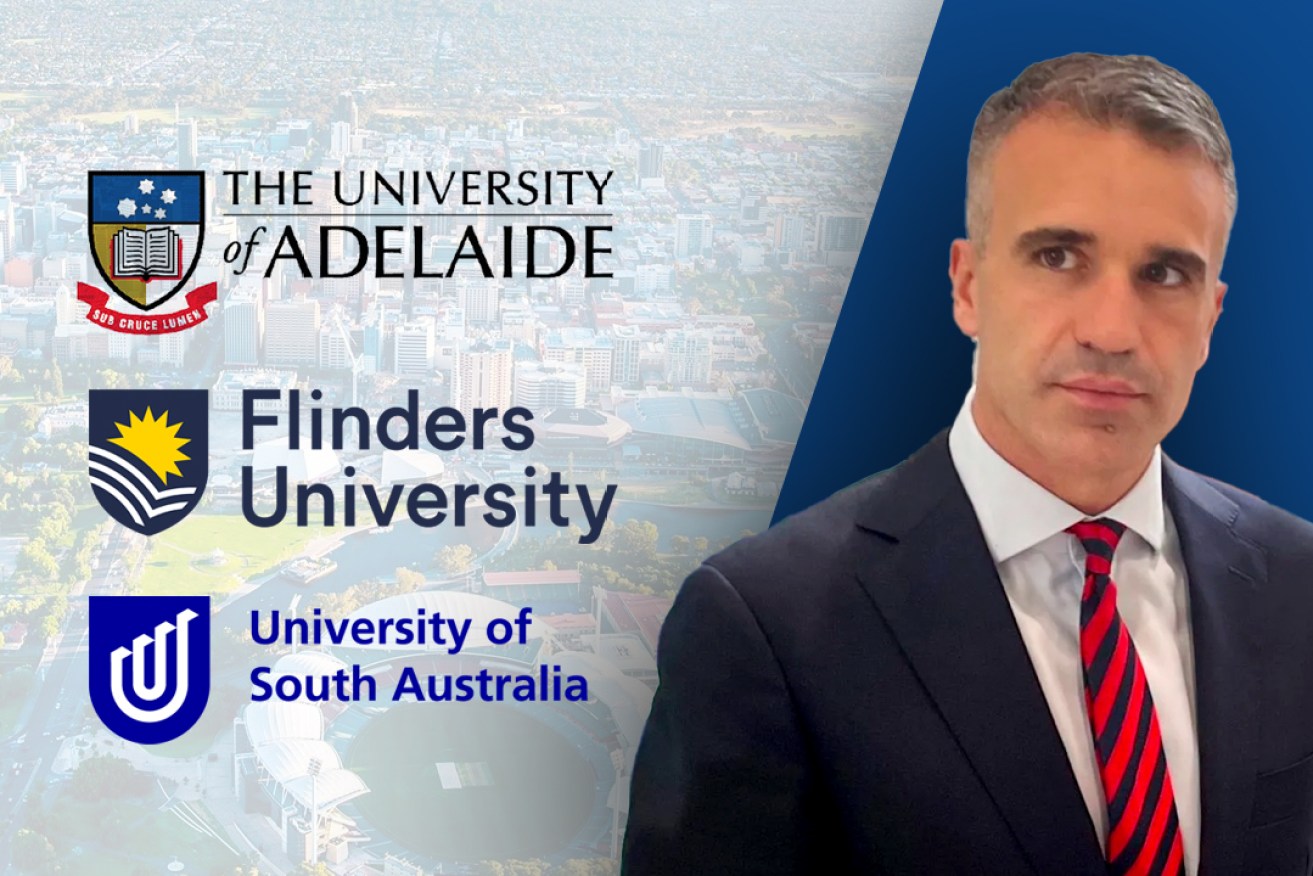SA ‘compromised’: Premier warns unis over lack of planning degrees
Premier Peter Malinauskas has told the state’s three universities they must fix the lack of undergraduate urban planning degrees in South Australia, warning skills shortages could threaten his government’s “bold vision” for Adelaide’s future.


Premier Peter Malinauskas says a lack of urban planning degrees in South Australia is putting pressure on council planning departments and seeing students move interstate for their studies. Image: Tom Aldahn/InDaily
In a letter sent to the vice-chancellors of Flinders University, the University of Adelaide and University of South Australia last October, released after a freedom of information request, Malinauskas said developing an undergraduate urban planning degree was an issue “of South Australian importance”.
None of the state’s three universities currently offer an undergraduate urban planning degree, with UniSA the only institution still running a masters program in the field.
UniSA discontinued its four-year undergraduate Bachelor of Urban and Regional Planning (Honours) degree in 2019.
A year later, the University of Adelaide suspended its postgraduate Master of Planning and Master of Planning (Urban Design) degrees.
Spokespeople for both universities said the degrees were discontinued due to low student demand.
For example, the number of students enrolled in the University of Adelaide’s Master of Planning (Urban Design) dropped from 25 in 2018 to 15 in 2019 and 12 in 2020, according to statistics provided to InDaily.
The number of students enrolled in the university’s stand-alone Master of Planning went from 16 to 21 to 17 over the same period. The program stopped taking enrolments in 2020.
Malinauskas’ letter outlines his concern that the absence of an undergraduate planning degree in South Australia is “limiting pathways to the only masters degree available”.
“I understand that this market gap has directed students to seek this offering interstate, but it also adds to the pressures of local Governments who are struggling to fill positions in their planning departments leading them to engage consultants,” Malinauskas wrote.
“The lack of skilled local planners has also meant that some local Governments have been forced to retrain Graduate Lawyers to be planners or development officers.
“As the nation looks to find solutions to the issues around housing shortages, each state will need to have a highly skilled workforce to deliver complex outcomes in sustainable planning without compromising liveability.
“Without the ability to create and add to the specialised workforce from within the state, South Australia is in a compromised position.”
Malianuskas’ letter was sent five months before Planning Minister Nick Champion accused some South Australian councils of “falling behind” on strategic planning for future housing growth.
Champion told 45 councils they had “more work to do” to prepare for increased density and future population growth. The full list of councils in question is available here.
It also comes amid a broader push by the current government to shift South Australia’s housing growth targets away from a compact urban form and towards a more spread out urban footprint, with both the Premier and the Planning Minister rejecting criticisms of “urban sprawl”.
I am writing to all the three major South Australian Universities to call on you to ensure this gap is not permanent and to reiterate that Urban Planning courses are of South Australian importance.
The centrepiece of the new planning vision is an extensive land rezoning program in Adelaide’s outer suburbs to allow construction of 23,700 new homes across Hackham, Sellicks Beach, Concordia and Dry Creek.
Malinauskas wrote in his October letter to the universities that a lack of local planning skills could threaten the government’s “bold vision”.
“Good planning and urban development is a tightrope walk between growth and liveability,” he wrote.
“But not having the skills and workforce to deliver our bold vision can seriously impact the positive outcomes sought.
“I am writing to all the three major South Australian Universities to call on you to ensure this gap is not permanent and to reiterate that Urban Planning courses are of South Australian importance.”
The state government earlier this year established a taskforce with representatives from the three universities to address the lack of urban planning degrees.
The taskforce, named the Built Environment Education Liaison Group (BEELG), is chaired by the Planning Minister and held its first meeting in February. It is due to meet again in May.
A spokesperson for the University of Adelaide said the university was “acutely aware of the need for more planners and other built environment professionals in the state, and is investigating new approaches to deliver urban planning courses”.
They also highlighted the university’s other degrees in architecture, landscape architecture and the built environment, which have some overlap with urban planning.
“Currently, the University of Adelaide’s Master of Planning degrees are on hold because they attracted very low numbers of students and are deemed unviable at such low enrolment levels,” the university spokesperson said.
“There are strong enrolments in our Architecture programs as well as the Master of Landscape Architecture. As part of these programs, students explore urban design and planning concepts.
“As a member of the SA government’s … BEELG, the University of Adelaide is very keen to pursue ways to address the skills shortage in the built environment professions (including planners, architects, surveyors, valuers, conveyancers, building surveyors and landscape architects).”

The first meeting of the BEELG on February 1, 2023. Photo: supplied
Spokespeople for both UniSA and Flinders University argued their institutions were best placed to address the gap in planning skills in future.
“UniSA offers a two-year Master of Urban and Regional Planning and a 12-month Graduate Diploma in Urban and Regional Planning,” a UniSA spokesperson said.
“The Masters program is the quickest route to addressing the state’s skills gap, producing highly qualified graduates in two-thirds of the time of an undergraduate degree.
“The program has consistently been in demand due to its pathways from undergraduate degrees and UniSA is currently developing additional pathways for students to gain this qualification.”
The spokesperson said the withdrawal of UniSA’s four-year undergraduate urban planning degree in 2019 was due to “continued declining enrolments” and occurred after “extensive industry consultation”.
Flinders University deputy vice-chancellor (students), Professor Romy Lawson, argued Flinders had an “unrivalled base for expansion” in the urban planning field.
The university currently offers an undergraduate Bachelor of Geospatial Information Systems, which overlaps with urban planning, although not a standalone degree.
“Flinders University is acutely aware of SA’s workforce shortages in urban planning and has accelerated the development of new offerings to address these critical skills needs,” Lawson said.
“Our highly regarded existing courses spanning ‘smart, liveable and resilient cities’ ‘environment and society’ , ‘geospatial information systems’, ‘infrastructure systems engineering’ and ‘transport systems engineering’, coupled with Flinders’ ranking as SA’s number one university for student experience, provides an unrivalled base for expansion.”
Lawson also said Flinders was developing “a new suite of offerings that will be ready for student enrolments next year” when the university moves into its new city campus in the Festival Tower.
‘Will take some time’: No quick skills fix as Govt eyes TAFE pathway
The head of the state’s urban development lobby said a “shortage” of urban planners in South Australia was impacting on a range of planning issues.
“There is no doubt the shortage of urban planners has put pressure on councils and makes it difficult for them to do the longer-term strategic planning that we would expect,” said Pat Gerace, CEO of the Urban Development Institute SA division.
“It is also impacting other functions like the timely delivery of services and information related to development approvals which is so critical during a housing crisis.”
He added that the UDIA was “pleased the government is working to address this through its support of an undergraduate degree in urban planning”.
“It is critical that we get some action on this matter as soon as possible because of the long lead time it takes to complete the course and get real-world experience,” he said.
“Unfortunately this means it will take some time before the situation improves.”

Developing ties: UDIA (SA) CEO Pat Gerace, Premier Peter Malinauskas, UDIA President Daniel Palumbo and Planning Minister Nick Champion at the 2022 UDIA luncheon. Photo: absCreative
Champion said students needed encouragement “from primary school through to high school” to enter industries that are “fundamental to the property and construction industry”.
He also said TAFE would be opening enrolments next semester for a new local government planning course in a bid to fill entry-level vacancies at council level.
“I am pleased to say TAFE SA is working with Local Governments and industry for the creation of a Diploma in Local Government (Planning) to help fill entry-level vacancies, with enrolments commencing semester two 2023.
“TAFE SA also offers a certificate 4 and diploma of surveying, with these courses producing quality graduates.
“However, the lack of undergraduate courses on offer must also be addressed.”
Champion said the BEELG discussed recognition of prior learning between entry-level courses and degrees, as well as industry accreditation requirements, at its first meeting.
“We are now assessing current study pathways and post-graduate accreditation, registration and licencing,” he said.
“The results, including identified gaps in education pathways, will be discussed at the next BEELG meeting held in May and shape future actions to help reverse the shortage.”
-Additional reporting by Stephanie Richards




